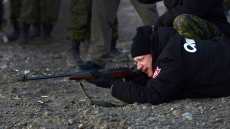OTTAWA — Statistics Canada says the country's homicide rate fell last year to 1.44 victims for every 100,000 people, its lowest level since 1966.
The agency says the 2013 rate was eight per cent lower than in 2012.
It says police reported 505 homicides in 2013, down 38 from the previous year.
The report attributes the overall decrease in homicides to a drop of 40 deaths reported in Quebec after two years of higher-than-average numbers of homicides in the province.
Quebec reported 68 homicides in 2013, representing a rate of 0.83 per 100,000 population, the lowest rate recorded in the province since reporting began in 1961.
Six provinces reported modest increases in the number of homicides in 2013, although even with these increases, the homicide rates in nearly every province and territory were below their 10-year averages in 2013.
The exceptions were Newfoundland and Labrador and Prince Edward Island, where the 2013 homicide rates were above their previous 10-year average.
Homicide rates continued to be generally highest in the West and the North. Provincially, Manitoba reported the highest homicide rate with 3.87 per 100,000 population, followed by Saskatchewan with 2.71, Alberta at 2.04 and British Columbia with 1.66.
Nunavut, with 11.24 per 100,000, and the Northwest Territories, with 4.59, reported homicide rates higher than any province, while there were no homicides in Yukon for the third consecutive year.
Among metropolitan areas, Regina reported the highest homicide rate at 3.84 per 100,000 population, followed by Winnipeg and Thunder Bay.
Homicide rates were below the national average in the two largest metropolitan areas, as Toronto had a rate of 1.34 and Montreal was at 1.08.
Vancouver, at 1.72, was above the national average.
Firearm-related homicides were down, but fatal stabbings increased. There were 131 homicides tied to guns in 2013, down 41 from 2012. This was the lowest rate of firearm-related homicide since comparable data became available in 1974.
Shooting still accounted for about a quarter of homicides.
Most gun-related homicides were committed with handguns, a trend that has held over the last 20 years. Despite this, the rate of handgun-related homicides reached its lowest point since 1998.
The number of fatal stabbings grew by 31 cases, to 195 deaths. Knives accounted for about 40 per cent of all homicides.
Gang-related homicides fell to 85 in 2013, compared with 96 reported the previous year. It was the first drop after three years of steady numbers.
The rate of gang-related homicide was 0.24 per 100,000 population, its lowest level since 2004. The rate of gang killings was highest in British Columbia and Manitoba.
The victims in almost 90 per cent of homicides knew their killers. The rate of stranger homicide was at its lowest level in over 40 years.
The number of victims of homicide committed by a current or former spouse, common-law partner, dating partner or other intimate partner decreased in 2013. There were 68 intimate partner homicides reported in 2013, 14 fewer than in the previous year.





